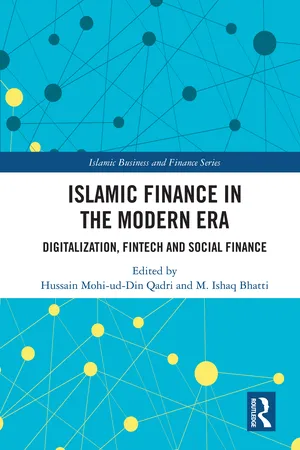
Islamic Finance in the Modern Era
Digitalization, FinTech and Social Finance
- 360 pages
- English
- ePUB (mobile friendly)
- Only available on web
Islamic Finance in the Modern Era
Digitalization, FinTech and Social Finance
About This Book
This book focuses on recent developments in financial technology: specifically, how FinTech affects the Islamic finance industry. It examines the challenges of Shariah compliance and explores opportunities for riba -free finance.
The book describes contemporary FinTech solutions, investigating their relation to Islamic financial institutions. It outlines the current status of Islamic FinTech, arguing that it can provide Shariah-compliant innovative financial services to bridge the gap and compete with or complement conventional finance. Islamic FinTech can play a transformational role in making Islamic finance more accessible to a wide range of audiences and can also support the SME sector, which has been significantly impacted by the fallout of the COVID-19 pandemic.
First, the book addresses thematic issues in Islamic finance, including its role in poverty eradication, elevating SMEs, and the Islamic digital economy. Second, it examines Shariah-compliant instruments in Islamic finance. The final part encompasses the risk profile of Islamic finance products and explores mitigation strategies. The book simultaneously presents theories, practice, and key issues, introducing new ideas and perspectives to the Islamic banking and financial community.
The primary audience for the book will be researchers and scholars of Islamic economics and finance, and it will also appeal to practitioners and regulatory bodies.
Frequently asked questions
Table of contents
- Cover
- Half Title
- Series
- Title
- Copyright
- Contents
- List of Figures
- List of Tables
- List of Contributors
- Foreword
- 1 Issues in Islamic Economics and Finance: Exploring the Path to Socio-Economic Justice
- 2 Emergence of Islamic Digital Economy
- 3 The Role of Islamic Social Finance in Poverty Eradication
- 4 Islamic Finance Technology and its Success in Countering the Impact of the COVID-19 Pandemic on SMEs
- 5 Islamic Framework for Behavioral and Socio-Economic Justice
- 6 Islamic Banking in Non-Muslim Countries
- 7 Shariah Indices and Human Wellbeing
- 8 Islamic Insurance (Takaful): An Overview
- 9 Determinants of Islamic Banking Industry Performance: Does Economic Value Added Matter?
- 10 An Analysis of Credit Risk in ASEAN and GCC Islamic Banks
- 11 Mediating Effect of Corporate Image towards Islamic Bank Loyalty: The Role of Religiosity, Collectivism, Sight Cues, and CSR
- 12 Gender Disparities in Corporate E-Discourse of Islamic Banks in Pakistan
- 13 Evaluation of Environmental, Social, and Governance Criteria in Banking Practices: A Comparison of Islamic and Conventional Banks of Pakistan
- 14 Islamic Finance and the Shadow Economy
- 15 Mutual Fund Performance: The Case of Saudi Arabia
- 16 Strident Response of Islamic Banking Industry to Political, Financial, and Pandemic Events
- 17 Interpretations of Musharakah Mutanaqisah in Islamic Finance: A Cross-Cultural Perspective
- 18 Opportunities for Developing New Islamic Financial Services in the Emerging Market
- 19 The Power of Faith-Based Finance: How Islamic Finance Supports the Achievement of the Sustainable Development Goals
- 20 Concluding Remarks
- Index